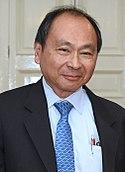Francis Fukuyama Quote
Mental models and rules are intimately intertwined, since the models often suggest clear rules for societies to follow. Religions are more than theories; they are prescriptive moral codes that seek to enforce rules on their followers. They, like the rules they enjoin, are invested with considerable emotional meaning and therefore are believed for intrinsic reasons and not simply because they are accurate or useful. While religious beliefs cannot be verified, they are also difficult to falsify. All of this reinforces the fundamental conservatism of human societies, because mental models of reality once adopted are hard to change in the light of new evidence that they are not working.
Francis Fukuyama
Mental models and rules are intimately intertwined, since the models often suggest clear rules for societies to follow. Religions are more than theories; they are prescriptive moral codes that seek to enforce rules on their followers. They, like the rules they enjoin, are invested with considerable emotional meaning and therefore are believed for intrinsic reasons and not simply because they are accurate or useful. While religious beliefs cannot be verified, they are also difficult to falsify. All of this reinforces the fundamental conservatism of human societies, because mental models of reality once adopted are hard to change in the light of new evidence that they are not working.
Related Quotes
About Francis Fukuyama
Francis Yoshihiro Fukuyama (; born October 27, 1952) is an American political scientist, political economist, international relations scholar, and writer.
Fukuyama is best known for his book The End of History and the Last Man (1992), which argues that the worldwide spread of liberal democracies and free-market capitalism of the West and its lifestyle may signal the end point of humanity's sociocultural evolution and political struggle and become the final form of human government, an assessment met with numerous and substantial criticisms. In his subsequent book Trust: Social Virtues and Creation of Prosperity (1995), he modified his earlier position to acknowledge that culture cannot be cleanly separated from economics. Fukuyama is also associated with the rise of the neoconservative movement, from which he has since distanced himself.
Fukuyama has been a senior fellow at the Freeman Spogli Institute for International Studies since July 2010 and the Mosbacher Director of the Center on Democracy, Development and the Rule of Law at Stanford University. In August 2019, he was named director of the Ford Dorsey Master's in International Policy at Stanford.
Before that, he served as a professor and director of the International Development program at the School of Advanced International Studies of Johns Hopkins University. Previously, he was Omer L. and Nancy Hirst Professor of Public Policy at the School of Public Policy at George Mason University.
He is a council member of the International Forum for Democratic Studies founded by the National Endowment for Democracy and was a member of the Political Science Department of the RAND Corporation. He is also one of the 25 leading figures on the Information and Democracy Commission launched by Reporters Without Borders. In 2024 he received the Riggs Award for Lifetime Achievement in International and Comparative Public Administration.
Fukuyama is best known for his book The End of History and the Last Man (1992), which argues that the worldwide spread of liberal democracies and free-market capitalism of the West and its lifestyle may signal the end point of humanity's sociocultural evolution and political struggle and become the final form of human government, an assessment met with numerous and substantial criticisms. In his subsequent book Trust: Social Virtues and Creation of Prosperity (1995), he modified his earlier position to acknowledge that culture cannot be cleanly separated from economics. Fukuyama is also associated with the rise of the neoconservative movement, from which he has since distanced himself.
Fukuyama has been a senior fellow at the Freeman Spogli Institute for International Studies since July 2010 and the Mosbacher Director of the Center on Democracy, Development and the Rule of Law at Stanford University. In August 2019, he was named director of the Ford Dorsey Master's in International Policy at Stanford.
Before that, he served as a professor and director of the International Development program at the School of Advanced International Studies of Johns Hopkins University. Previously, he was Omer L. and Nancy Hirst Professor of Public Policy at the School of Public Policy at George Mason University.
He is a council member of the International Forum for Democratic Studies founded by the National Endowment for Democracy and was a member of the Political Science Department of the RAND Corporation. He is also one of the 25 leading figures on the Information and Democracy Commission launched by Reporters Without Borders. In 2024 he received the Riggs Award for Lifetime Achievement in International and Comparative Public Administration.
